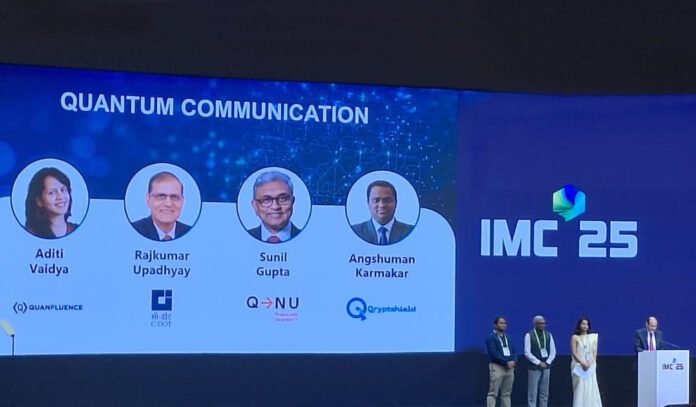IMC 2025, organised jointly by the Department of Telecommunications and the Cellular Operators Association of India under the Ministry of Communications, aimed to showcase India’s achievements in 5G, 6G, and emerging technologies.
Many innovators, such as Ericsson, BSNL, Qualcomm, Nokia, Airtel, Jio, VVDN Technologies, Samsung, Snapdragon to medium sized enterprises to Indian startups across several industries from India and globally demonstrated Aatmanirbhar Bharat (Self-reliant India) in alignment with India’s Prime Minister Narendra Modi’s vision. Also, along with innovators, government bodies like Department of Science and Technology, Government of India, policy makers (GSMA), many universities (IITs, reputed engineering colleges, MBA Institutes) took part actively. DST supported actively and generously startups to help them demonstrate their path breaking innovations inside DST booth.
At India Mobile Congress 2025, held under the theme “Innovate to Transform”, discussions on emerging technologies such as optical based communication, semiconductor-based technology, Li-Fi technology, 6G and quantum security highlighted India’s commitment to staying at the forefront of technological advancements as they are critical enablers of digital sovereignty.
Prime Minister Narendra Modi inaugurated the event on October 8 at Yashobhoomi, New Delhi. After watching startup presentations on quantum communication, 6G, and semiconductors, PM Modi declared: “India’s technological future is in capable hands”.
Union Communications Minister Jyotiraditya Scindia reinforced this, stating India has transformed from a “technology taker” to “the digital flag bearer of the world.” QNu Labs’ among the leading companies presented its hybrid end-to-end quantum-cybersecurity portfolio in front of Prime Minister and high-profile dignitaries.
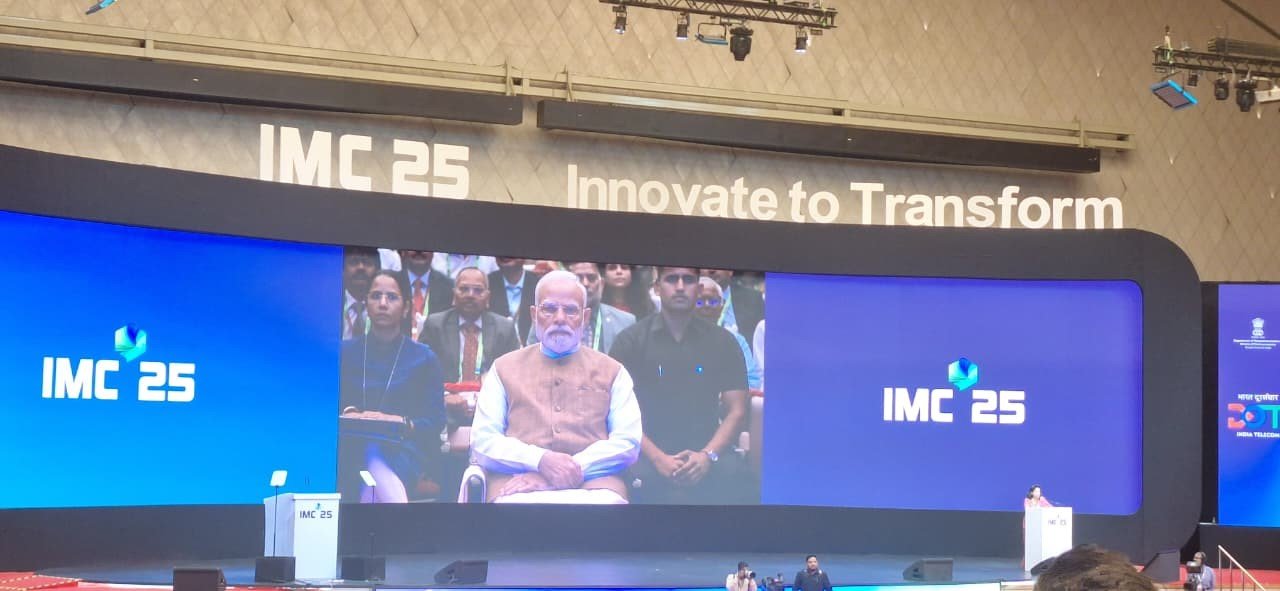
In a perfectly timed convergence during Cybersecurity Awareness Month, IMC Days 2025 served as an unstoppable launch pad for QNu’s quantum security revolution with India’s top leadership and industry giants.
The “Vocal for Local” Economic Opportunity
Recent announcements at IMC 2025 revealed how India’s quantum security push creates opportunities beyond defence applications. On day 2 Quantum-safe panel discussion organised by DST, many professors from IIT Delhi, Madras, task force members of National Quantum Mission, SEBI CISO presented various sessions in demystifying quantum technology for common men and women, including PQC, cryptography and crypto agility.
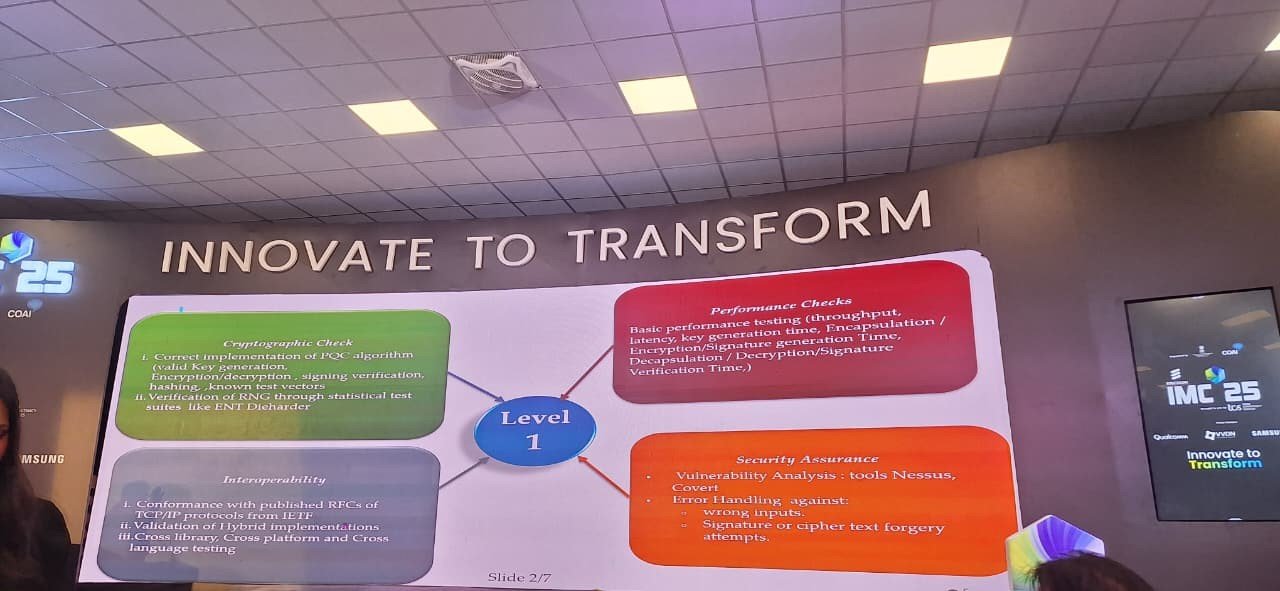
Sunil Gupta, CEO and Co-founder of QNu Labs, spoke at the panel about what is Quantum-safe technology and various offerings QNu Labs provides globally from defence to enterprises including PSU, Telecom, BFSI, Pharma/healthcare, other critical sectors.
The economic multiplier is significant. NITI Aayog’s Quantum Technologies Report projects that India’s quantum technology market will reach $1.2 billion by 2030, with security applications comprising 62% of that value. The report identifies job creation potential of 45,000 specialised positions across the quantum security value chain.
Domestic demand from government, defence, and critical infrastructure drives innovation. Innovation produces exportable technology. Export success attracts investment. Investment funds research and development. Better R&D produces more sophisticated solutions. This virtuous cycle is already beginning.
The ecosystem is forming around quantum security in India. Deep technology companies like QNu Labs are building quantum-safe solutions to safeguard data and communications – be it bank transactions, drug development and discovery, confidential customer and citizen’s data, or national assets. Telecom operators are deploying them. Academic institutions are building talent pipelines. Government agencies are establishing funding mechanisms.
Many countries worldwide are struggling to build quantum capabilities. India’s combination of technical talent, manufacturing capacity, and large domestic market creates unique advantages. Organisations embracing indigenous quantum security today help build this ecosystem while securing their own operations.
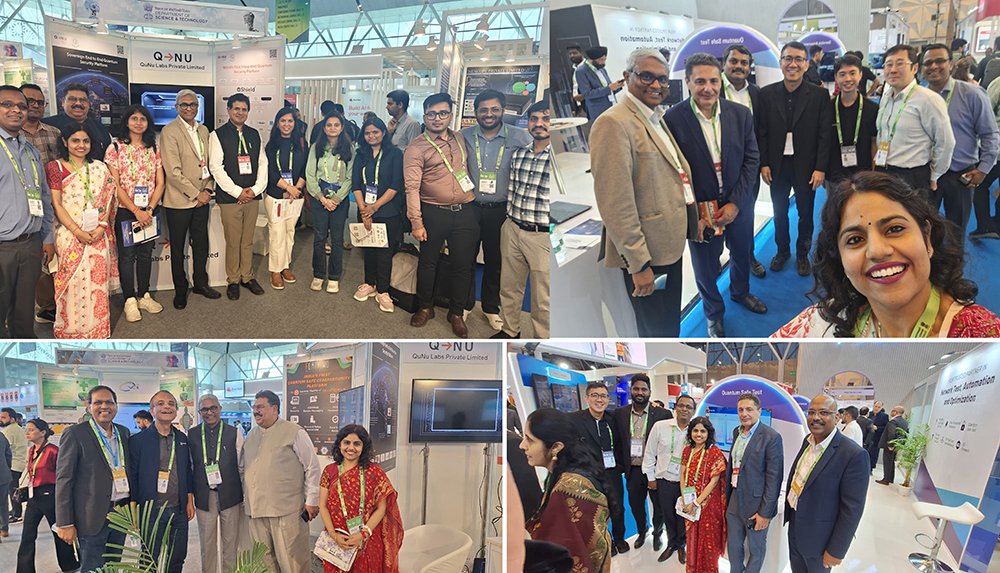
IMC 2025: Where Startups Shaped India’s Quantum Future
India Mobile Congress 2025 marked a departure from traditional tech forums. This year’s edition wasn’t just about showcasing established players—it deliberately platformed India’s startup ecosystem as architects of the nation’s technological sovereignty.
The convergence of startup agility, government support, and enterprise adoption creates momentum that transcends any single technology deployment. It’s the foundation of sustained innovation advantage.
The economic multiplier is significant. NITI Aayog’s Quantum Technologies Report projects that India’s quantum technology market will reach $1.2 billion by 2030, with security applications comprising 62% of that value. The report identifies job creation potential of 45,000 specialised positions across the quantum security value chain
Inclusivity defined the event’s character. Beyond metros, IMC 2025 brought together innovators from tier-2 and tier-3 cities, researchers from lesser-known institutions, and entrepreneurs building solutions for uniquely Indian challenges. The Startup Zone featured over 150 emerging companies, with dedicated mentorship sessions connecting them to potential customers in government, defence, and critical infrastructure sectors.
Global Momentum is Accelerating
IDC’s Worldwide Quantum Computing Forecast projects that spending on quantum security solutions will reach $8.6 billion globally by 2027, with a compound annual growth rate of 48.7%.
IBM’s Institute for Business Value reports that 42% of organisations in critical infrastructure sectors have moved beyond pilots to production quantum security deployments. The Quantum Threat Timeline Report from the Global Risk Institute notes that nations with domestic quantum security capabilities will control $15 billion in exports by 2035.
India Mobile Congress 2025 marked a departure from traditional tech forums. This year’s edition wasn’t just about showcasing established players—it deliberately platformed India’s startup ecosystem as architects of the nation’s technological sovereignty
Three Big Questions Answered at IMC 2025
Over four days at IMC 2025’s exhibition halls, a pattern emerged in conversations with honorary dignitaries, C level executives from defence, telecom, and critical infrastructure sectors.
How exposed are we, really?
According to Gartner’s 2024 Security & Risk Management Survey, 62% of CISOs identified quantum computing as a top three emerging security threat, yet only 23% have begun post-quantum cryptography assessments. The gap between awareness and action is where vulnerability lives.
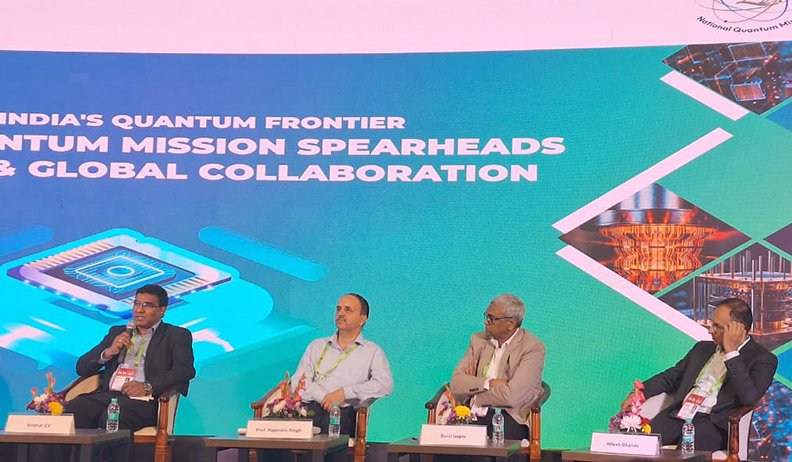
Current public key encryption systems like RSA 2048 could be decrypted within 24 hours once sufficiently powerful quantum computers using Shor’s algorithm become available.
What’s this going to cost us?
Think about the data your organisation has protected with today’s “secure” encryption, financial transactions, classified communications, and intellectual property. That protection has a shelf life. Compliance isn’t optional anymore. The US Office of Management and Budget estimated that transitioning prioritised sensitive information within the US government to post-quantum encryption will cost approximately $7.1 billion between 2025 and 2035. While India’s numbers will differ, the scale of investment required is similar. The real question is: what’s the cost of not transitioning?
According to Gartner’s 2024 Security & Risk Management Survey, 62% of CISOs identified quantum computing as a top three emerging security threat, yet only 23% have begun post-quantum cryptography assessments. The gap between awareness and action is where vulnerability lives
Is this actually deployable, or just research?
Fair skepticism. For years, quantum technology lived exclusively in research labs. But something shifted in 2021 when QNu Labs deployed its first large-scale quantum lab for the Indian Armed Forces in Mhow.
Similarly, public telecom operator, BSNL has built a robust and far-reaching network over the years, catering to the armed forces, public sector undertakings, enterprises, banks, and more. QNu teams with BSNL to introduce quantum-safe services over BSNL’s existing network by signing a MoU during IMC. This collaboration represents a true win-win scenario, customers gain access to advanced quantum security solutions, BSNL can further monetise its infrastructure by offering premium, value-added services, and QNu Labs, in turn, contribute to safeguarding India’s most widely deployed communication network.
The writer is CMO, QNu Labs. She is member of Harvard Research Advisory Council, TEDx Speaker, Board Advisor, Corporate Mentor and Guest Faculty in IIT-B, Alliance University, IIM-Calcutta Research Park, JAGSOM

